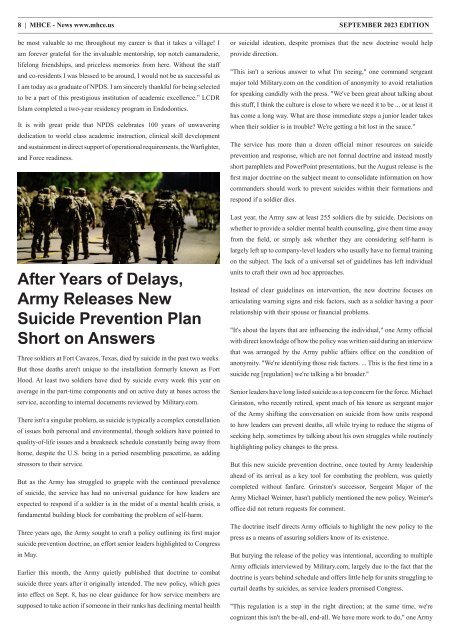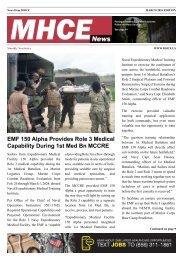Create successful ePaper yourself
Turn your PDF publications into a flip-book with our unique Google optimized e-Paper software.
8 | <strong>MHCE</strong> - News www.mhce.us SEPTEMBER <strong>2023</strong> EDITION<br />
be most valuable to me throughout my career is that it takes a village! I<br />
am forever grateful for the invaluable mentorship, top notch camaraderie,<br />
lifelong friendships, and priceless memories from here. Without the staff<br />
and co-residents I was blessed to be around, I would not be as successful as<br />
I am today as a graduate of NPDS. I am sincerely thankful for being selected<br />
to be a part of this prestigious institution of academic excellence.” LCDR<br />
Islam completed a two-year residency program in Endodontics.<br />
It is with great pride that NPDS celebrates 100 years of unwavering<br />
dedication to world class academic instruction, clinical skill development<br />
and sustainment in direct support of operational requirements, the Warfighter,<br />
and Force readiness.<br />
After Years of Delays,<br />
Army Releases New<br />
Suicide Prevention Plan<br />
Short on Answers<br />
Three soldiers at Fort Cavazos, Texas, died by suicide in the past two weeks.<br />
But those deaths aren't unique to the installation formerly known as Fort<br />
Hood. At least two soldiers have died by suicide every week this year on<br />
average in the part-time components and on active duty at bases across the<br />
service, according to internal documents reviewed by Military.com.<br />
There isn't a singular problem, as suicide is typically a complex constellation<br />
of issues both personal and environmental, though soldiers have pointed to<br />
quality-of-life issues and a breakneck schedule constantly being away from<br />
home, despite the U.S. being in a period resembling peacetime, as adding<br />
stressors to their service.<br />
But as the Army has struggled to grapple with the continued prevalence<br />
of suicide, the service has had no universal guidance for how leaders are<br />
expected to respond if a soldier is in the midst of a mental health crisis, a<br />
fundamental building block for combatting the problem of self-harm.<br />
Three years ago, the Army sought to craft a policy outlining its first major<br />
suicide prevention doctrine, an effort senior leaders highlighted to Congress<br />
in May.<br />
Earlier this month, the Army quietly published that doctrine to combat<br />
suicide three years after it originally intended. The new policy, which goes<br />
into effect on Sept. 8, has no clear guidance for how service members are<br />
supposed to take action if someone in their ranks has declining mental health<br />
or suicidal ideation, despite promises that the new doctrine would help<br />
provide direction.<br />
"This isn't a serious answer to what I'm seeing," one command sergeant<br />
major told Military.com on the condition of anonymity to avoid retaliation<br />
for speaking candidly with the press. "We've been great about talking about<br />
this stuff, I think the culture is close to where we need it to be ... or at least it<br />
has come a long way. What are those immediate steps a junior leader takes<br />
when their soldier is in trouble? We're getting a bit lost in the sauce."<br />
The service has more than a dozen official minor resources on suicide<br />
prevention and response, which are not formal doctrine and instead mostly<br />
short pamphlets and PowerPoint presentations, but the August release is the<br />
first major doctrine on the subject meant to consolidate information on how<br />
commanders should work to prevent suicides within their formations and<br />
respond if a soldier dies.<br />
Last year, the Army saw at least 255 soldiers die by suicide. Decisions on<br />
whether to provide a soldier mental health counseling, give them time away<br />
from the field, or simply ask whether they are considering self-harm is<br />
largely left up to company-level leaders who usually have no formal training<br />
on the subject. The lack of a universal set of guidelines has left individual<br />
units to craft their own ad hoc approaches.<br />
Instead of clear guidelines on intervention, the new doctrine focuses on<br />
articulating warning signs and risk factors, such as a soldier having a poor<br />
relationship with their spouse or financial problems.<br />
"It's about the layers that are influencing the individual," one Army official<br />
with direct knowledge of how the policy was written said during an interview<br />
that was arranged by the Army public affairs office on the condition of<br />
anonymity. "We're identifying those risk factors. ... This is the first time in a<br />
suicide reg [regulation] we're talking a bit broader."<br />
Senior leaders have long listed suicide as a top concern for the force. Michael<br />
Grinston, who recently retired, spent much of his tenure as sergeant major<br />
of the Army shifting the conversation on suicide from how units respond<br />
to how leaders can prevent deaths, all while trying to reduce the stigma of<br />
seeking help, sometimes by talking about his own struggles while routinely<br />
highlighting policy changes to the press.<br />
But this new suicide prevention doctrine, once touted by Army leadership<br />
ahead of its arrival as a key tool for combating the problem, was quietly<br />
completed without fanfare. Grinston's successor, Sergeant Major of the<br />
Army Michael Weimer, hasn't publicly mentioned the new policy. Weimer's<br />
office did not return requests for comment.<br />
The doctrine itself directs Army officials to highlight the new policy to the<br />
press as a means of assuring soldiers know of its existence.<br />
But burying the release of the policy was intentional, according to multiple<br />
Army officials interviewed by Military.com, largely due to the fact that the<br />
doctrine is years behind schedule and offers little help for units struggling to<br />
curtail deaths by suicides, as service leaders promised Congress.<br />
"This regulation is a step in the right direction; at the same time, we're<br />
cognizant this isn't the be-all, end-all. We have more work to do," one Army


















